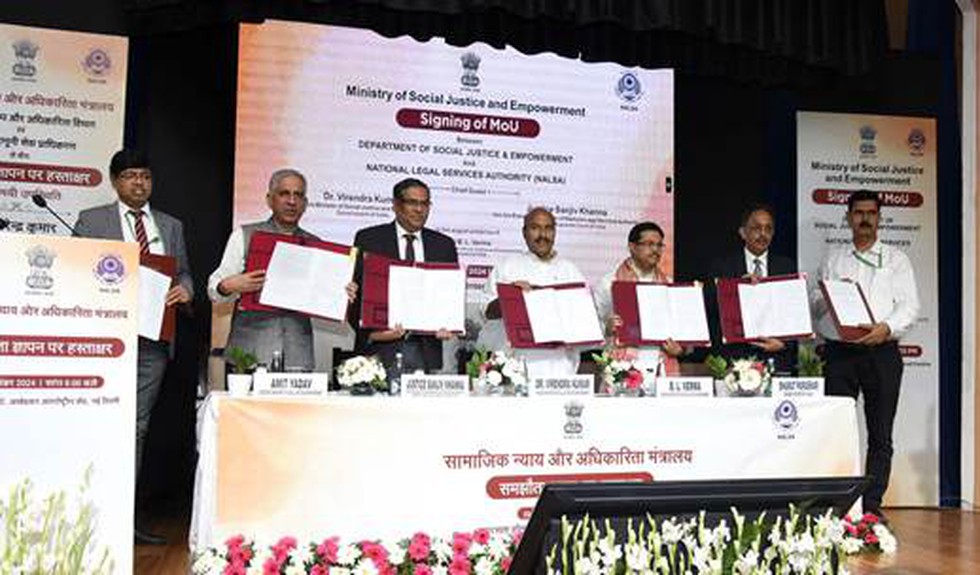The Department of Social Justice and Empowerment (DoSJE), Government of India, and the National Legal Services Authority (NALSA) signed a Memorandum of Understanding (MoU) in New Delhi to enhance public awareness about various Acts, Rules, and Schemes of the Department. This partnership specifically targets marginalized and vulnerable sections of society.
Objectives of the MoU
- Legal Aid and Literacy: NALSA, established under the Legal Services Authorities Act of 1987, aims to provide legal aid to disadvantaged groups and promote legal literacy.
- Campaigns and Seminars: The MoU includes a commitment from both organizations to conduct campaigns, seminars, and events to improve the reach and impact of social welfare schemes for vulnerable communities across India.
Key Attendees
The MoU signing event was attended by:
- Shri Virendra Kumar, Union Minister for Social Justice & Empowerment
- Shri Justice Sanjiv Khanna, Judge of the Supreme Court of India & Executive Chairman of NALSA
Launch of SARTHIE 1.0 Initiative
During the event, the SARTHIE 1.0 initiative was officially launched. This joint effort aims to empower disadvantaged communities, including:
- Scheduled Castes (SCs)
- Other Backward Classes (OBCs)
- Senior Citizens
- Transgender Persons
- Victims of Alcoholism and Substance Abuse
- Persons engaged in begging
- Denotified and Nomadic Tribes
Alignment with Sustainable Development Goals
The SARTHIE 1.0 initiative aligns with the United Nations 2030 Agenda for Sustainable Development, particularly focusing on:
- Eradicating poverty
- Reducing inequality
- Promoting social protection policies
Goals of the Collaboration
- Bridging Awareness Gap: The collaboration seeks to bridge the awareness gap regarding social welfare programs and provide legal assistance for effective implementation.
- Strengthening Social Justice: The partnership between the executive and judiciary will enhance social justice for all.
Outreach and Implementation
The Department of Social Justice and Empowerment, in collaboration with NALSA, will extend awareness generation to the grassroots level. State Legal Services Authorities (SLSAs) and District Legal Services Authorities (DLSAs) will organize awareness camps across the country through para-legal volunteers and panel lawyers.
Focus Areas of Awareness Camps
The awareness camps will focus on the following five important Acts implemented by the Department:
- Protection of Civil Rights Act, 1955
- Scheduled Castes and the Scheduled Tribes (Prevention of Atrocities) Act, 1989
- The Maintenance and Welfare of Parents and Senior Citizens Act, 2007
- The Transgender Persons (Protection of Rights) Act, 2019
- Prohibition of Employment as Manual Scavengers and their Rehabilitation Act, 2013
Conclusion
The legal awareness and outreach initiatives will span from the Panchayat to the State level, ensuring that targeted audiences are informed of their legal rights and the available government welfare programs.
Multiple-Choice Questions (MCQs):
- What is the primary goal of the MoU signed between DoSJE and NALSA?
- A) To increase legal fees for marginalized groups
- B) To enhance public awareness about various Acts and Schemes of the Department
- C) To reduce government funding for social welfare programs
- D) To eliminate the need for legal literacy programs
Answer: B) To enhance public awareness about various Acts and Schemes of the Department
- Who were the key attendees at the MoU signing event?
- A) Prime Minister and Chief Justice of India
- B) Union Minister for Social Justice & Empowerment and Supreme Court Judge
- C) President and Vice President of India
- D) Governors of various states
Answer: B) Union Minister for Social Justice & Empowerment and Supreme Court Judge
- What does the SARTHIE 1.0 initiative aim to empower?
- A) Wealthy individuals
- B) Corporate businesses
- C) Disadvantaged communities
- D) Foreign diplomats
Answer: C) Disadvantaged communities
- Which of the following Acts is NOT one of the five important Acts mentioned in the outreach initiatives?
- A) Protection of Civil Rights Act, 1955
- B) Scheduled Castes and Scheduled Tribes (Prevention of Atrocities) Act, 1989
- C) Right to Information Act, 2005
- D) The Transgender Persons (Protection of Rights) Act, 2019
Answer: C) Right to Information Act, 2005
- What is the aim of the awareness camps organized by SLSAs and DLSAs?
- A) To increase legal fees for marginalized groups
- B) To inform targeted audiences about their legal rights and government welfare programs
- C) To promote private legal services
- D) To reduce the number of legal aid cases
Answer: B) To inform targeted audiences about their legal rights and government welfare programs
